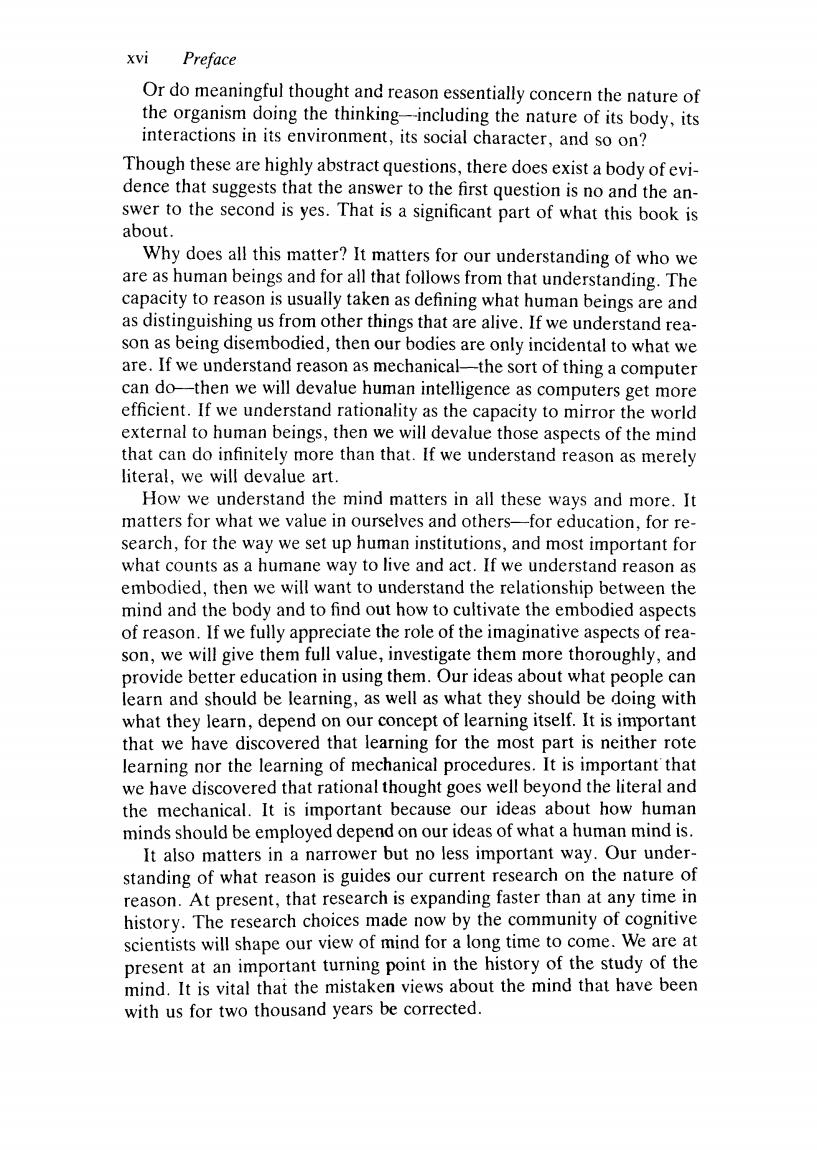正在加载图片...

xvi Preface Or do meaningful thought and reason essentially concern the nature of the organism doing the thinking-including the nature of its body,its interactions in its environment,its social character,and so on? Though these are highly abstract questions,there does exist a body of evi- dence that suggests that the answer to the first question is no and the an- swer to the second is yes.That is a significant part of what this book is about. Why does all this matter?It matters for our understanding of who we are as human beings and for all that follows from that understanding.The capacity to reason is usually taken as defining what human beings are and as distinguishing us from other things that are alive.If we understand rea- son as being disembodied,then our bodies are only incidental to what we are.If we understand reason as mechanical-the sort of thing a computer can do-then we will devalue human intelligence as computers get more efficient.If we understand rationality as the capacity to mirror the world external to human beings,then we will devalue those aspects of the mind that can do infinitely more than that.If we understand reason as merely literal,we will devalue art. How we understand the mind matters in all these ways and more.It matters for what we value in ourselves and others-for education,for re- search,for the way we set up human institutions,and most important for what counts as a humane way to live and act.If we understand reason as embodied,then we will want to understand the relationship between the mind and the body and to find out how to cultivate the embodied aspects of reason.If we fully appreciate the role of the imaginative aspects of rea- son,we will give them full value,investigate them more thoroughly,and provide better education in using them.Our ideas about what people can learn and should be learning,as well as what they should be doing with what they learn,depend on our concept of learning itself.It is important that we have discovered that learning for the most part is neither rote learning nor the learning of mechanical procedures.It is important that we have discovered that rational thought goes well beyond the literal and the mechanical.It is important because our ideas about how human minds should be employed depend on our ideas of what a human mind is. It also matters in a narrower but no less important way.Our under- standing of what reason is guides our current research on the nature of reason.At present,that research is expanding faster than at any time in history.The research choices made now by the community of cognitive scientists will shape our view of mind for a long time to come.We are at present at an important turning point in the history of the study of the mind.It is vital that the mistaken views about the mind that have been with us for two thousand years be corrected.XVI Preface Or do meaningful thought and reason essentially concern the nature of the organism doing the thinking--including the nature of its body, its interactions in its environment, its social character, and so on? Though these are highly abstract questions, there does exist a body of evidence that suggests that the answer to the first question is no and the answer to the second is yes. That is a significant part of what this book is about. Why does all this matter? It matters for our understanding of who we are as human beings and for all that follows from that understanding. The capacity to reason is usually taken as defining what human beings are and as distinguishing us from other things that are alive. If we understand reason as being disembodied, then our bodies are only incidental to what we are. If we understand reason as mechanical-the sort of thing a computer can do--then we will devalue human intelligence as computers get more efficient. If we understand rationality as the capacity to mirror the world external to human beings, then we will devalue those aspects of the mind that can do infinitely more than that. If we understand reason as merely literal, we will devalue art. How we understand the mind matters in all these ways and more. It matters for what we value in ourselves and others-for education, for research, for the way we set up human institutions, and most important for what counts as a humane way to live and act. If we understand reason as embodied, then we will want to understand the relationship between the mind and the body and to find out how to cultivate the embodied aspects of reason. If we fully appreciate the role of the imaginative aspects of reason, we will give them full value, investigate them more thoroughly, and provide better education in using them. Our ideas about what people can learn and should be learning, as well as what they should be doing with what they learn, depend on our concept of learning itself. It is important that we have discovered that learning for the most part is neither rote learning nor the learning of mechanical procedures. It is important that we have discovered that rational thought goes well beyond the literal and the mechanical. It is important because our ideas about how human minds should be employed depend on our ideas of what a human mind is. It also matters in a narrower but no less important way. Our understanding of what reason is guides our current research on the nature of reason. At present, that research is expanding faster than at any time in history. The research choices made now by the community of cognitive scientists will shape our view of mind for a long time to come. We are at present at an important turning point in the history of the study of the mind. It is vital that the mistaken views about the mind that have been with us for two thousand years be corrected